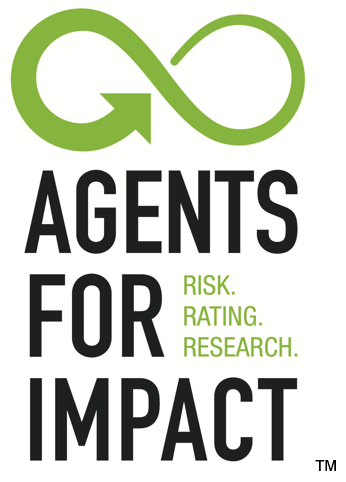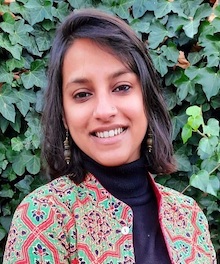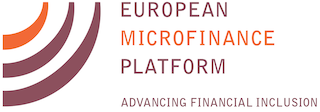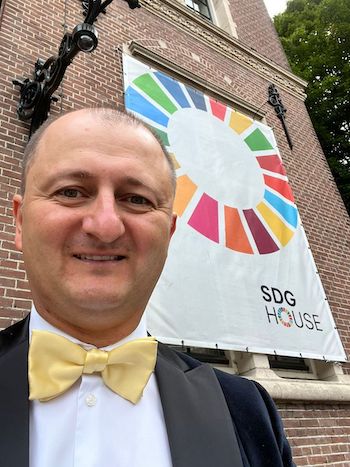 This is part of a series of features sponsored by Agents for Impact (AFI), a German impact investing firm whose products include the AFI Sustainability Alignment Rating (AFISAR©) tool. AFISAR© is a trust mark – in microfinance and other forms of social business – signifying a commitment to positive and enduring change for people and the planet, based on the UN Sustainable Development Goal (SDG) framework.
This is part of a series of features sponsored by Agents for Impact (AFI), a German impact investing firm whose products include the AFI Sustainability Alignment Rating (AFISAR©) tool. AFISAR© is a trust mark – in microfinance and other forms of social business – signifying a commitment to positive and enduring change for people and the planet, based on the UN Sustainable Development Goal (SDG) framework.
AFISAR© helps MFIs leverage the market’s growing focus on sustainability performance to raise capital from international investors and, particularly, impact investors. The rating helps investors and social businesses understand their strengths and weaknesses and devise effective strategies to minimize negative impact and maximize positive impact to the benefit of the organization – its employees, clients and other stakeholders – as well as the environment.
The conversation below outlines the AFISAR© rating process carried out in the “direct partnership” format by a leading MFI like Svasti Microfinance. Direct partnership offers a continuous and immersive experience to facilitate sustainable transitions. The active dialogue and engagement embedded in the AFISAR© process enable the MFI as well as asset managers to embark on a journey that leads to long-term sustainable development. AFI highly values long-term partnerships with organizations sharing our mission of achieving the UN SDGs. We take this so seriously that a rating above the sustainability threshold is required for the disbursement funds.
To date, AFI has used AFISAR© to rate 35+ microfinance and SME finance institutions in Asia, East Africa and Eastern Europe, helping the institutions demonstrate their SDG competency and alignment.
 Pratibha Singh (pictured): How did you become interested in microfinance?
Pratibha Singh (pictured): How did you become interested in microfinance?
Arunkumar Padmanabhan: I was a lawyer and had worked for some years with ICICI Bank. Based on that experience, I wanted to set up a commercial business in the social impact space. We started in the slums of Mumbai, and now we have expanded to eight states in India with 220,000 borrowers across 120 branches.
PS: What makes the Svasti model unique?
AP: The key to success in this field is based on three aspects: people, process and technology. Our vision follows the “people-first” approach. Technology and innovation are driving forces as well, and we have built all of our systems from the ground up. That gives us a significant competitive advantage. Meanwhile, we have focussed on client protection and social impact from a very early stage in our development. With AFISAR©, we have become one of the few companies that is measuring its performance based on the SDGs. Constantly trying to improve in impact-driven areas is of great strategic importance.
PS: What is at stake for
 A panel of microfinance luminaries shared their moments of pride and disappointment at the closing plenary of this year’s European Microfinance Week. Yannick Milev of the Cambodian microfinance institution Chamroeun expressed his admiration for the staff members of Chamroeun, who continued to work through the COVID-19 pandemic at significant risk to their and their families’ health because “stopping operations completely would have had a terrible effect on us and on our clients.” Mr Milev added that Chamroeun issued many loans during the early days of the pandemic to help clients diversify in response to the economic effects of COVID-19.
A panel of microfinance luminaries shared their moments of pride and disappointment at the closing plenary of this year’s European Microfinance Week. Yannick Milev of the Cambodian microfinance institution Chamroeun expressed his admiration for the staff members of Chamroeun, who continued to work through the COVID-19 pandemic at significant risk to their and their families’ health because “stopping operations completely would have had a terrible effect on us and on our clients.” Mr Milev added that Chamroeun issued many loans during the early days of the pandemic to help clients diversify in response to the economic effects of COVID-19.

 are pleased to have an experienced investor at our side that will carry Agents for Impact into the future and enable us to expand our business,” says Dr Andrij Fetsun, AFI’s CEO (pictured).
are pleased to have an experienced investor at our side that will carry Agents for Impact into the future and enable us to expand our business,” says Dr Andrij Fetsun, AFI’s CEO (pictured). This report on funding water, sanitation and hygiene (WASH) cites the UN’s Sustainable Development Goal (SDG) 6 – Clean Water and Sanitation – as well as data indicating 3.6 billion people worldwide have limited access to
This report on funding water, sanitation and hygiene (WASH) cites the UN’s Sustainable Development Goal (SDG) 6 – Clean Water and Sanitation – as well as data indicating 3.6 billion people worldwide have limited access to The authors describe the recent turmoil in global food markets and the resulting “worst food crisis in generations.” The war in Ukraine has had a major impact on markets in Russia and Ukraine, which together previously produced a quarter of the wheat and most of the sunflower oil sold worldwide. Meanwhile, increases in
The authors describe the recent turmoil in global food markets and the resulting “worst food crisis in generations.” The war in Ukraine has had a major impact on markets in Russia and Ukraine, which together previously produced a quarter of the wheat and most of the sunflower oil sold worldwide. Meanwhile, increases in Pratibha Singh (pictured): How did you become interested in microfinance?
Pratibha Singh (pictured): How did you become interested in microfinance?